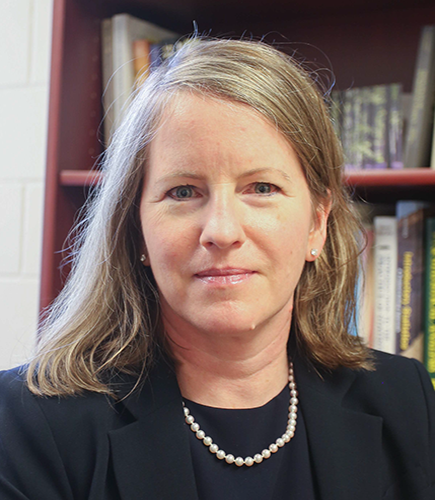Dr. Christine (Tina) Fahim (PhD, MSc) is an implementation scientist and leads the Team for Implementation, Evaluation and Sustainability at the Knowledge Translation Program, St. Michael’s Hospital. She holds an Associate Scientist position in the Department of Health Policy and Management at Johns Hopkins University, Bloomberg School of Public Health. She obtained her MSc in Health Systems at the University of Ottawa followed by a PhD in Health Research Methods, Evidence and Impact from McMaster University and a postdoctoral fellowship at the Johns Hopkins University School of Public Health, Department of Health Policy and Management. Dr. Fahim’s research focuses on the science and practice of knowledge translation to implement evidence-based interventions at the provider, organization, and systems level.
Zoe Jordan
Professor Zoe Jordan is the Executive Director of JBI (formerly the Joanna Briggs Institute). She has been working in the field of evidence-based healthcare for more than 20 years and has a passion for supporting the use of high-quality evidence to inform decisions at the point of care. She has published and presented widely and has a keen interest in the relationship between communication theory, engagement and translation science, particularly in an increasingly global context. Working across JBI’s international collaboration, Professor Jordan is also interested in cross cultural collaboration, including but not limited to discursive competence, cultural brokering and relational empathy.
Tayaba Khan
Dr Tayaba is a dental surgeon and an MBA in Health and Hospital Management. She holds over 15 years of experience in dentistry, management, medical communications, ethical contexts in healthcare and stem cell research, liaising with researchers, managing university partnership, health IT, patient advocacy, and project management.
She is presently a member at the International Advisory Committee of Strategic Patient Oriented Research Evidence Alliance (SPORea); Merit Reviewer at the Patient-Centred Outcomes Research Institute (PCORI), USA; Advisor at the Patient and Family Centred Care Network, Alberta Children’s Hospital, Canada; and Member of the Patient Advisors Network (PAN), Canada. As a freelancer, she is developing grants for EU 2020 SME and USA SBIR grant cycles. Further, she is a member and content reviewer for the Society of Simulation in Healthcare. She recently started as an instructor for a weekend Diploma in Health Management program at a local college.
Some of the companies and organizations where she has worked include Medical News, Dental News, Dental Tribune International, Medical Voice, Digital Care, eTrendz, Centre for Regenerative Medicine and Stem Cell Research at the Aga Khan University Pakistan, and Alien Technology Transfer, London.
She coordinated and executed the annual Aga Khan University International Ethics Thinking Group meetings in 2018 (London) and 2019 (Lisbon), actively contributing towards discussions on stem cell research and future human ethics perspectives.
Dr Khan is passionate about patient advocacy and creating solutions bridging information gaps between various stakeholders in healthcare industry, with patients at the heart.
Jean-Christophe Bélisle-Pipon
Bioethicist by training, Dr. Bélisle-Pipon is conducting research at the interface of health policy, citizen and patient engagement in research and health governance, as well as business practices. His professional experience, having worked for both the pharmaceutical industry and the government, provided him with an insider’s understanding of the ethical, policy and societal dimensions of health technology development and assessment. Dr. Bélisle-Pipon uses both empirical and conceptual bioethics methodologies to make recommendations on the appropriate management and resolution of ethical issues for health regulators and industry decision-makers. He carried out his CIHR-funded postdoctoral fellowship at the Petrie-Flom Center for Health Law Policy, Biotechnology, and Bioethics at the Harvard Law School (2017-2020) and pursued a second fellowship at McGill University (2020). He was member of the Board of Directors of Québec Health Research Fund and currently serves on the Board of Directors of the International Association of Bioethics. Dr. Bélisle-Pipon joined the Faculty of Health Sciences in 2021.
Research Interests:
Bioethics; Applied Ethics; Empirical Bioethics; Health Policy; Ethics of Artificial Intelligence; Health Technology Assessment; Citizen Engagement; Conflict of Interest; Patient-Oriented Research; Ethics of Drug Marketing and Commercialization; Business Ethics; Corporate Social Responsibility
Lenora Duhn
Dr. Lenora Duhn, RN, PhD, is an Assistant Professor (Tenure Track) at the School of Nursing, Faculty of Health Sciences, Queen’s University, in Kingston, Ontario, Canada. Prior to beginning her academic career at Queen’s University, she worked within a large Ontario tertiary care teaching hospital in a variety of clinical, research, and administrative roles. Currently, Dr. Duhn teaches in the Nursing undergraduate and graduate programs, and the Health Quality graduate programs. Her doctoral thesis focused on patient engagement in safety as a means to reduce healthcare harm by exploring and describing patient attitudes and behaviours concerning their involvement in ensuring safe care at the clinical level, and resulted in the development of a 5-Facet Framework about Patient Engagement in Patient Safety. Her program of research, Beneficence: Research for the Benefit of People in a Health Environment, is grounded in the ethical concept of beneficence – action-oriented to not only prevent harm but to actively engage in promoting good – includes the research themes: ‘patient/client and family engagement’ and ‘safeguarding’, with specific topics relating to escalating clinical deterioration and trauma-informed care. With over 25 years of nursing experience, Lenora is dedicated to the advancement of safe, equitable care for all patients and their families, and in support of healthcare providers and learners.
Shanon Mcquitty
Born and bred in B.C., Shanon was diagnosed with Rheumatoid Disease in the Fall of 2011 when her GP told her she had ‘RA’, her GP also told her that is was a field that was progressing rapidly with research and treatment and it gave her hope from the beginning.
Shanon attended a Reaching Out With Arthritis Research Forum, organized by the Arthritis Patient Advisory Board (APAB) at Arthritis Research Canada in 2013 and in 2014 became an active member on APAB, providing patient input in research as a patient partner, followed by an interest in future healthcare professional education by becoming a Health Mentor at UBC and attending the Where Is The Patient Voice is Professional Healthcare Education Conference in 2015 then became one of the founding members of Patients in Education (PIE). Shanon also served on the Consumer Coalition of the Arthritis Alliance of Canada until 2019. Being a part of the SPOR Evidence Alliance is an important component of Shanon’s passion for advocacy in research and the education of future healthcare providers.
Rosemary Wilson
Rosemary Wilson (RN, HBScN, MN, PhD) is an Associate Professor in the School of Nursing/ Department of Anesthesiology at Queen’s University and a Nurse Practitioner in chronic pain care at Kingston Health Sciences Centre. She has been a nurse for 28 years and an NP since 2000. She has practiced in diverse settings: home care, acute care medicine and surgery and outpatient specialty care in Canadian and sub-Saharan Africa. She has expertise in opioid prescribing, deprescribing and risk mitigation that is the result of her practice, her research program and from work she has done developing educational materials for controlled substance prescribers.
She is an the Associate Director, Graduate Nursing Programs and the Deputy Director, Practice for the Queen’s Collaboration for Health Care Quality. The work that she does with QcHcQ includes the generation of knowledge syntheses and translation for practice.
Her research centres around acute and chronic pain and spans from pluralist, clinically-oriented research to knowledge translation and quality improvement. If she had to declare a methodological alliance, it would be qualitative but she lets my research questions drive my activity!
She has 4 grown children, a very tolerant husband, a giant dog and a ridiculous cat. She is a crazy sailor and spend every spare moment on the water either racing or cruising.
Brett Thombs
Dr. Thombs is Professor, McGill University and Senior Investigator, Lady Davis Institute, Jewish General Hospital in Montreal, Quebec. He conducts research on strategies to improve quality of life among people living with the rare autoimmune disease scleroderma, on the identification and management of depression, and on improving research conduct and reporting. He directs the Scleroderma Patient-centered Intervention Network (SPIN), which maintains an ongoing cohort of people with scleroderma from 50 sites in 7 countries and conducts embedded trials of patient-centered programs, and the DEPRESSD Project, a large international collaboration that conducts individual participant data meta-analyses of depression screening tool accuracy. Dr. Thombs is the Chair of the Canadian Task Force on Preventive Health Care, a Fellow of the Canadian Academy of Health Sciences, a Member of the Royal Society of Canada College of New Scholars, Artists and Scientists, and a Fonds de recherche Santé – Québec Distinguished Research Scholar.
Matthew Page
Matthew Page is a Senior Research Fellow in the School of Public Health and Preventive Medicine at Monash University, funded by an ARC Discovery Early Career Researcher Award. He leads a programme of research on methods for evidence synthesis, which builds on the research undertaken during his PhD (2011-2015) and NHMRC Early Career Fellowship (2015-2019). Matthew’s research interests span many areas of evidence synthesis, including examination of the transparency and reproducibility of systematic reviews; methods to address reporting biases (e.g. publication bias, selective reporting bias); tools to assess risk of bias in randomized trials and non-randomized studies of interventions; and examination of selective inclusion of results in meta-analyses. He is leading the 2020 update of the PRISMA reporting guideline for systematic reviews and meta-analyses, and was an associate editor for the 2019 edition of the Cochrane Handbook for Systematic Reviews of Interventions. He frequently collaborates with clinicians on systematic reviews of interventions for a range of conditions, which often informs his research agenda.
Eva Grunfeld
Dr. Grunfeld is a physician-scientist and Director of the Knowledge Translation Research Network, Health Services Research Program, at the Ontario Institute for Cancer Research. At the University of Toronto, Dr. Grunfeld holds the post of Giblon Professor and Vice-Chair (Research) at the Department of Family and Community Medicine; professor at the Institute for Health Policy, Management and Evaluation; and professor at the Dalla Lana School of Public Health. She also holds the position of Chair of the Institute for Cancer Research, Institute Advisory Board, at the Canadian Institutes of Health Research.
Dr. Grunfeld is a leader in cancer health services and outcomes research. Her research focuses on evaluation and knowledge translation of cancer health services, covering the entire spectrum of cancer control activities. She is internationally recognized for research on cancer survivorship, integration of care, and on cancer outcomes. Dr. Grunfeld uses a mixed-methods approach including randomized controlled trials (RCTs), qualitative research and outcomes research. Knowledge translation is an integral part of all her research activities. She has conducted several multi-centre RCTs on cancer survivorship which have influenced clinical practice guidelines and policies internationally. Dr. Grunfeld holds many peer-review grants as Principal Investigator and has served on many committees to further the goals of cancer control in Canada and internationally. She obtained her medical degree from McMaster University and doctoral degree in cancer epidemiology from Oxford University.









